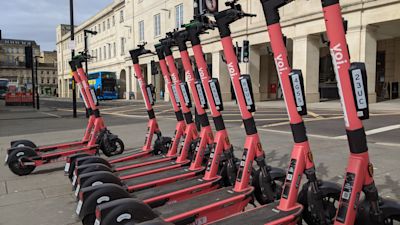Problem or solution? The region's e-scooter trials divide opinion

Watch Caron Bell's report
A trial scheme which has seen electric scooters available for rent in towns and cities across the West Country is proving controversial five months in.
While some have praised the scooters as an eco-friendly way to get around, others say they are a dangerous nuisance.
It has been five months since a Government trial scheme saw e-scooters pop up across the South West, including in Gloucester, Yeovil, Bristol and Bath.
While privately-owned scooters are still illegal to use on public roads and pavements, the scheme has been launched to see how well they mix on the region's roads.
In theory, scooter use is tightly controlled; they are hired via an app, and are 'geo-tagged', meaning they will only operate in certain zones, and at limited speeds.
Users have to park them in designated parking spots (generally on broad pavements), otherwise the app can fine them. Only adults with a driving licence are allowed to hire e-scooters.
But there have been issues with the scooters blocking pavements - and some councillors and disability campaigners say the vehicles are being routinely misused.
Sarah Gayton from the National Federation of the Blind of the UK said there are "two main issues" with them.
She added: "One - people can't see them and they're being ridden on the pavements. So it's terrifying if these e-scooters whizz past [visually-impaired people].
"The second thing is that they're actually left all over the pavement. They're blocking pavements. They're a massive trip hazard because of the shape of them."
The scooters in Bath and Bristol are hired out by the Swedish company Voi.
Voi says it takes complaints seriously and bans users who routinely misuse scooters. The firm is also working with local authorities to install parking racks. They say e-scooters, and other forms of micro-mobility, are an important way of tackling congestion and air pollution.
Richard Corbett, the Regional General Manager of Voi UK & Ireland, told ITV News West Country: "E-scooters are here to really solve the transport challenge that we have in the UK.
"We need to find an alternative form of transport to riding by car - 50 per cent of nitrogen dioxide in our atmosphere is from road transport."
The e-scooter trials will last until October 2021, at which point the government will decide whether they can continue, and whether to legalise private e-scooters in 2022.
Read more: